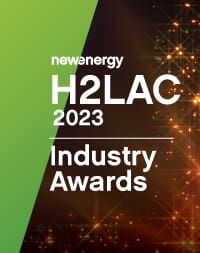Agenda
El mercado del hidrógeno en América Latina y el Caribe está despegando. Sin embargo, aún existen desafíos clave que deben abordarse, uno de los cuales es el desarrollo de la demanda local para sostener y escalar proyectos, haciéndolos comercialmente viables y descarbonizando las industrias nacionales.
13 y 14 de junio
- Roadshows nacionales de inversión. Estas sesiones específicas de países reúnen a líderes nacionales del sector público y privado para mostrar el progreso y las iniciativas, y resaltar las oportunidades para la participación y la inversión internacionales.
- Vitrinas de proyectos. Poner de relieve los proyectos de la región que están avanzando a pasos agigantados. ¿Donde? ¿Cómo?
- Paneles de discusión intersectoriales. Necesitamos crear un mercado local para H2. Las industrias nacionales necesitan participar. ¿Como hacemos que esto funcione?
- Premios de la Industria H2LAC. Ceremonia de premiación que reconoce el liderazgo en el avance del hidrógeno en América Latina y el Caribe.
- Índice Hinicio/New Energy Hydrogen para América Latina y el Caribe. Brindará perspectivas claves y únicas sobre el desarrollo a nivel nacional en toda la región.
15 de Junio
- Visita al Centro Nuclear Almirante Álvaro Alberto. ¡Únete a nosotros para una visita al Centro Nuclear Almirante Álvaro Alberto! Los asistentes pasarán la tarde visitando el Observatorio Nuclear, la Generadora y Planta de Turbinas de Angra 2, la Planta de Retiro de Agua y PUS Angra 2, donde producen hidrógeno Rosado utilizando un electrolizador y desalinizando el agua del océano, que seré en el futuro usado dentro de la Villa de Praia Brava.
- H2-Offtakers Workshop. Organizado en colaboración con McKinsey & Co., el objetivo del H2-Offtakers Workshop es explorar cómo incorporar el uso y el despliegue de hidrógeno verde entre las empresas industriales de América Latina. Diseñado expresamente para altos ejecutivos corporativos, el taller buscará identificar casos de uso y condiciones favorables para la adquisición de H2 verde en múltiples industrias en LAC. Más información aquí.
- Vitrina de Hidrógeno del Gobierno Regional. Los asistentes a H2LAC pueden solicitar una invitación para participar en la mesa redonda de altos funcionarios de gobierno organizada por el Banco Interamericano de Desarrollo (BID). Al reunir a altos funcionarios gubernamentales y reguladores de todos los países H2 de la región, la mesa redonda busca medir el progreso hacia el hidrógeno país por país y evaluar qué aportes se requieren de las IFD y el sector privado para catalizar el progreso a nivel nacional.
¿Quieres participar en el evento de este año? Nos encantaría saber de usted.
The hydrogen market in Latin America and the Caribbean is taking off. However, there are still key challenges that need to be addressed, one of which is the development of local demand to sustain and scale projects, making them commercially viable, and decarbonizing national industries.
June 13-14
- National Investment Roadshows. These country specific sessions gather national public and private sector leaders to showcase progress and initiatives, and highlight opportunities for international engagement and investment.
- Project Showcases. Shining a spotlight on the projects in the region which are making strides. Where? How?
- Cross-industry Panel Discussions. We need to create a local market for H2. National industries need to buy-in. How do we make this happen?
- The H2LAC Industry Awards. Dedicated award ceremony recognizing leadership in the advancement of hydrogen across Latin America and the Caribbean.
- Hinicio/New Energy Hydrogen Index for Latin America & the Caribbean. Providing critical and unique insights into development at the national level across the region.
June 15
- Site Visit of the Almirante Álvaro Alberto Nuclear Center. Join us for a site visit of the Almirante Álvaro Alberto Nuclear Center, and spend the afternoon touring the Nuclear Observatory, Angra 2 Generator and Turbine facility, Water withdrawal and PUS Angra 2, where they produce Hydrogen with electrolyzer and desalinizing the ocean water.
- H2-Offtakers Workshop. Organized in collaboration with McKinsey & Co., the objective of the H2-Offtakers Workshop is to explore how to mainstream the use and deployment of green hydrogen among Latin America’s industrial companies. Designed expressly for senior corporate executives, the workshop will seek to identify use cases and enabling conditions for the procurement of green H2 across multiple industries in LAC. Learn more.
- Regional Government Hydrogen Showcase. H2LAC attendees can request an invitation to participate in a policymaker roundtable hosted by the Inter-American Development Bank (IDB). Gathering senior government officials and regulators from every H2 country in the region, the roundtable seeks to gauge progress towards hydrogen on a country-by-country basis, and assess what inputs are required from the DFIs and the private sector to catalyze progress at a national level.
Want to get involved in this year’s event? We’d love to hear from you.





























































































